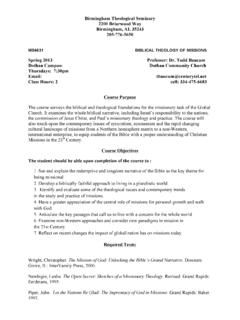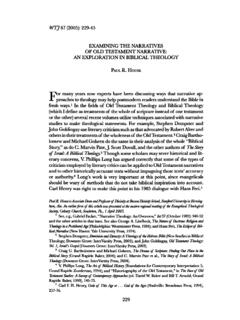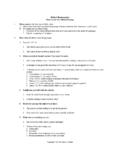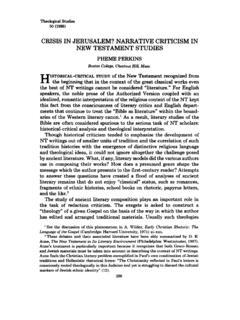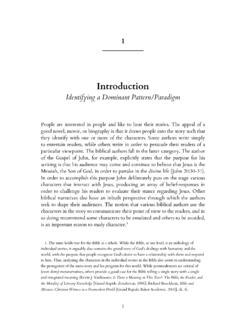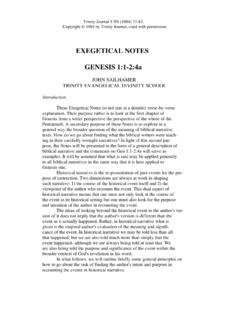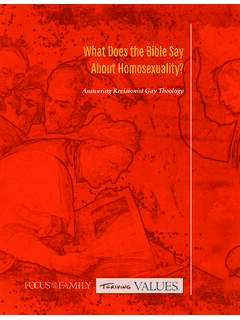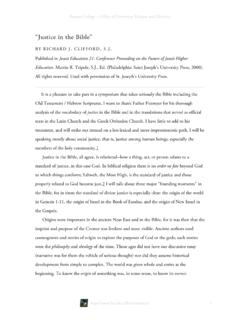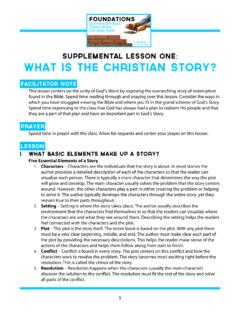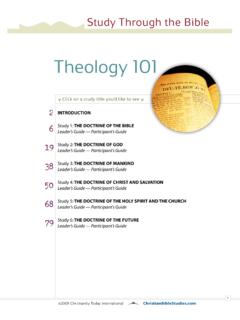Transcription of THE STORY OF SCRIPTURE: GENESIS TO REVELATION
1 Dr. Mark Yarbrough (email: ) BE201GB 3hrs Primary Contact: ) The STORY of scripture : GENESIS to REVELATION Office: Todd 112; phone (214) 887-5011 Grace Bible Church/College Station, TX Dallas Theological Seminary (4/26/17, 6:00 9:00 , 4/27-29/17, 8:00 4:00 ) THE STORY of scripture : GENESIS TO REVELATION I. COURSE DESCRIPTION An exposition of the biblical narrative of scripture from GENESIS to REVELATION with emphasis on the relationships between the content of all 66 books and the unity of what God is doing and saying throughout the entirety of canonical and biblical history. 3 hours II. COURSE OBJECTIVES A. Overall Objective The primary objective of this course is for the student to know how the general content of the Bible fits into one, unified, biblical narrative , that is traceable throughout scripture and completes a continuous, uninterrupted STORY as demonstrated through selected texts.
2 B. Cognitive Objectives You will be able to: .. so that you will develop your ability to: 1. Write a brief synthetic statement and analytical outline for the Bible. IDENTIFY THE STORY OF THE BIBLE. Recognizing the Bible s purpose and structure is a foundational component of its interpretation. 2. Reconstruct the history of the biblical narrative and the touch-points that unify the STORY of the Bible as a whole . REALIZE HOW EACH BOOK CONTRIBUTES. The unique message of each book contributes to overall message of the Bible. 3. Locate important topics, and characters in the Bible. KNOW YOUR WAY AROUND YOUR BIBLE. The ability to locate these is helpful in ministry, to expedite study, and provide reasons for our hope.
3 4. Interact with key events in biblical books and be able to connect them to the entire Gospel STORY . CONVEY THE WORD S AUTHORITY. The successful interpreter must be able to deal with the Bible as a whole and to connect the parts in order to display unity. C. Affective and Skill Objectives You will: .. so that you will be able to: 5. Record how the argument of the Bible is revealed through its content, and how it applies to its original audience and us today. WALK YOUR WAY THROUGH THE BIBLE. The Bible conveys its message through the understanding of its argument. This understanding is necessary for presenting it expositionally. 6. Develop a system for recording facts about the Bible in a cohesive and systematized manner.
4 ORGANIZE YOUR WORK. An effective research system gives assurance that learning is taking place and also helps develop one s own teaching methods. 7. Prepare to communicate the contents and principles of one or more of these books to others. PREACH AND TEACH THE WORD. The ultimate Dallas Theological Seminary goal of biblical exposition is to proclaim God s Word to others. BE201 GB The STORY of scripture Yarbrough, 2 April 26-29, 2016 III. COURSE TEXTBOOKS A. Required Duvall, Scott and Daniel Hays. Living God s Word. Grand Rapids: Zondervan, 2012. Marty, William. The whole Bible STORY . Minneapolis: Bethany House, 2011. Hanna, Kenneth. From Moses to Malachi: Exploring the Old Testament.
5 Bloomington, IN: CrossBooks, 2014. Hanna, Kenneth. From Gospels to Glory: Exploring the New Testament. Bloomington, IN: CrossBooks, 2014. B. Suggested Bailey, Mark and Tom Constable, Nelson s New Testament Survey. Nashville: Word Publishing (Thomas Nelson), 1999. Constable s Notes on the Bible (available through the DTS Book Store, or for free download at ) Walvoord, John R. and Roy B. Zuck, eds., The Bible Knowledge Commentary, New Testament, Colorado Springs: Victor, 1983. Walvoord, John R. and Roy B. Zuck, eds., The Bible Knowledge Commentary, Old Testament, Colorado Springs: Victor, 1985. C. Supplementary Bibliography. (Consult Appendix A for supplementary bibliography).
6 IV. COURSE REQUIREMENTS A. Reading Assignments (20%) Due by noon Friday, May 19, 2017 Students must complete the assigned reading material for the course. Preferably, this reading is to be done before the class in which the material is to be discussed. The required reading for Living God s Word should be done thoroughly. The required reading for From Moses to Malachi and From Gospels to Glory is exposure reading. This means it should be read quickly, for the purpose of orienting the student with basic background issues, biblical structure, and overview. Students should keep an up-to-date record of their reading. biblical texts will be assigned as needed in class.
7 Due to the nature of this course, it is suggested that the majority of the reading be completed prior to the beginning of the live sessions. All reading will be reported on Canvas. B. Written Assignment (35%) Due by noon Friday, May 19, 2017 Students must select one of the following options as the written assignment. Consult the rubrics in Appendix B (Chart/Project), Appendix C (Research Papers), and Appendix D (Argument) and for basic grading parameters and guidelines Option #1 A) Read William Marty s The whole Bible STORY and write a 5-page report. Interact with the overall structure and philosophy of Marty s presentation. What is the overall organization of Marty s presentation?
8 Why do you think he ordered the structure in the manner he did? What components did he utilize that you find helpful in telling the biblical narrative ? BE201 GB The STORY of scripture Yarbrough, 3 April 26-29, 2016 B) Summarize the content of the Bible in an explanatory chart or presentation. The material must be kept in chronological order but should also reflect an understanding of how the message is ordered. Divide the Bible into thematic categories based on defined and defended divisions. Identify the major themes/movements. Clues such as a significant event, a shift in location, subject (covenants), or literary form may assist in establishing divisions.
9 Create a horizontal chart or presentation for the STORY of the Bible, with titles for each division and for each major theme. This can be electronic or freehand. Summarize each section under its title. These summaries should be reflective of your personal observations and the observations discussed in class. In addition to the chart, also include a brief (2 3 pages) paper on the purposes of your chart, the structure of the presentation, and the message of the Bible. These pages are in addition to the requirements stated above and not a replacement of the explanation for the sections within the chart itself. Option #2. A) Read William Marty s The whole Bible STORY and write a 2 page summary of his presentation.
10 B) Write a biblical /Theological Paper Article 1 (The Scriptures) of the DTS doctrinal statement reads: We believe that "all scripture is given by inspiration of God, by which we understand the whole Bible is inspired in the sense that holy men of God were moved by the Holy Spirit to write the very words of scripture . We believe that this divine inspiration extends equally and fully to all parts of the writings historical, poetical, doctrinal, and prophetical as appeared in the original manuscripts. We believe that the whole Bible in the originals is therefore without error. We believe that all the Scriptures center about the Lord Jesus Christ in His person and work in His first and second coming, and hence that no portion, even of the Old Testament, is properly read, or understood, until it leads to Him.


